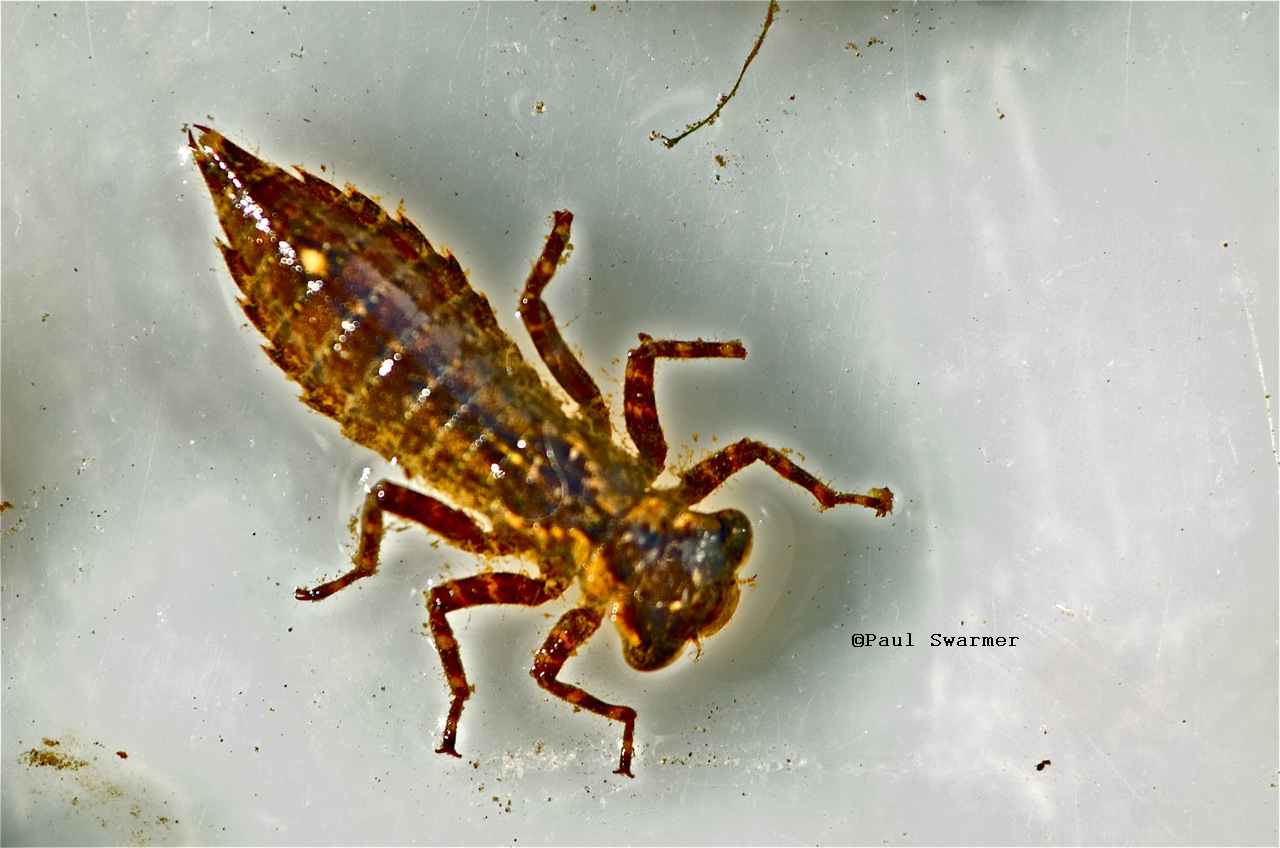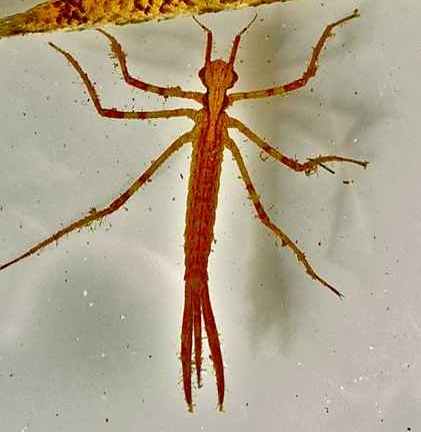1. Naked antennal segment 4 generally about 1/4 as long as hairy segment 3; wing pads divergent forming a triangular area between pairs; middle legs closer together at base than front legs. . . . . . . . . . . . . . . . . . . . . . . . . . . . . . . . . . . . . . . . . . . . . . . . . . . . Progomphus obscurus
Antennal segment 4 vestigial or mearly a small rounded knob; wing pads divergent or all four wingpads lying parallel along back; middle legs not closer together at base than front legs. . . 2
2. Body very flat; abdomen nearly circular in dorsal view; head behind eyes bearing 2 large and 2 small tubercles. . . . . . . . . . . . . . . . . . . . . . . . . . . . . . . . . . . . . . . . Hagenius brevistylus
Abdomen more nearly cylindrical' no tubercles on head. . . . . . . . . . . . . . . . . . . . . . . . . . . . 3
3. Wing pads strongly divergent. . . . . . . . . . . . . . . . . . . . . . . . . . . . . . . . . . . Ophiogomphus
Wing pads parallel (may be strongly divergent in exuvia). . . . . . . . . . . . . . . . . . . . . . . . . . . 4
4. Small lateral spines on abdominal segments 8 and 9; antennal segment 3 flattened, suboval. 5
Lateral spines on abdominal segments 6 or 7 to 9; antennal segment 3 at least 4 times longer than wide. . . . . . . . . . . . . . . . . . . . . . . . . . . . . . . . . . . . . . . . . . . . . . . . . . . . . . . . . . . . . 6
5. Antennal segment 3 about 1.3 times longer than wide, straight and parallel on it inner margin; frontal shelf (between antennae) truncate apically. . . . . . . . . . . . . Stylogomphus albistylus
Antennal segment 3 nearly oval, about 1.6 longer than wide, its inner margin convex; frontal shelf with 2 outer knobs, concave between knobs. . . . . . . . . . . . . . . . . . Lanthus parvulus
6. Segment 9 with middorsal ridge that terminates in a spine-like dorsal hook. . . . . . . . . . . . . . . . . . . . . . . . . . . . . . . . . . . . . . . . . . . . . . . . . . . . . . . . . . . . . . . . Drogogomphus spinosis
Segment 9 with dorsum rounded, dorsal hook absent or a raised knob. . . . . . . . . . . . . . . . . 7
7. Tibiae on front and middle legs with burrowing hooks absent or very small; abdomen elongate, tapering all the way rearward; later margins of abdomiinal segments 8 and 9 without saw-like teeth; palpal lobe ending in a strong, recurved end hook, followed by 1-4 shallow teeth. . . . . . . . . . . . . . . . . . . . . . . . . . . . . . . . . . . . . . . . . . . . . . . . . . . . . . . . . . . . . . . . . . . . Stylurus
Tibiae on front and middle legs with burrowing hooks well developed; abdomen usually not elongate and not tapering evenly all the way rearward; lateral margins of abdominal segments 8 and 9 with saw-like teeth; palpal lobe eiding in less of a recurved end hook, followed by more than 4 teeth. . . . . . . . . . . . . . . . . . . . . . . . . . . . . . . . . . . . . . . . . . . . . . . . . . . . . . . . . . . 8
8. Abdominal segment 10 longer than wide; end hook on palpal lobes not well developed but the inner margins bear 5-8 coarse teeth that are irregularly truncate. . . . . . . . . . . . . Arigomphus
Abdominal segment 10 shorter than wide; end hook on palpal lobes well developed, inner margin with 4-10 short regular teeth. . . . . . . . . . . . . . . . . . . . . . . . . . . Gomphus Complex

